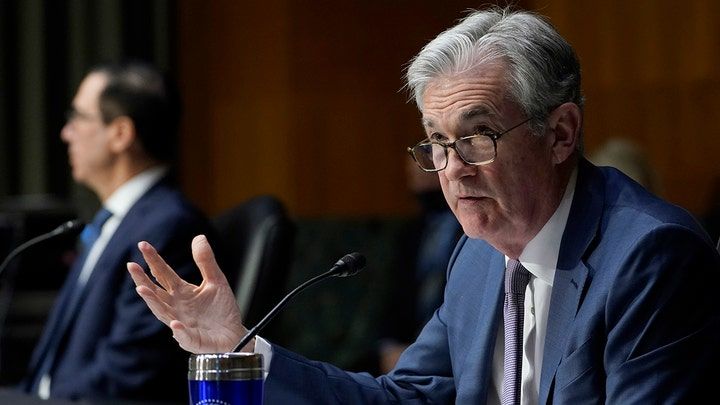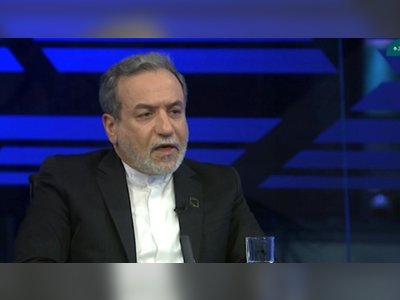
Economy has ‘fully recovered’ from COVID pandemic: Fed's Bullard
St. Louis Fed President James Bullard argued on Monday that the United States is in "pretty good shape for economic growth" and pointed out that gross domestic product (GDP) is "above pre-pandemic levels so we already fully recovered in that sense from the pandemic and the pandemic isn't even over yet."
Speaking with "Mornings with Maria" on Monday Bullard stressed that he believes "we’re looking at a very rapidly expanding economy."
GDP, the broadest measure of economic performance, grew at a 2% annual rate during the three months through September, the weakest of the recovery, according to an advanced estimate released late last month by the Commerce Department. Analysts surveyed by Refinitiv were expecting 2.7% growth. Second-quarter GDP was 6.7%.
Bullard acknowledged on Monday that "the growth rate slowed down in the third quarter that was just completed," but added that "we now expect that growth will return here in the fourth quarter and all the way through 2022."
"I’d have growth marked as higher than 4% for all of 2022," he told host Maria Bartiromo.
Bullard also discussed rate hikes on Monday, noting that he moved "rate hikes into 2022 last summer and now I’ve got two rate hikes in 2022."
 Federal Reserve Chairman Jerome Powell
Federal Reserve Chairman Jerome Powell
He also noted that "by conventional wisdom, we’d have to complete the taper [of monthly asset purchases] before we start with the normalization of the policy rate" and pointed out that he does not know "exactly how this is going to play out."
"It is data dependent," Bullard stressed. "You get into the second quarter there we wouldn’t be having very many purchases and it’s kind of questionable what kind of impact they’d be having anyway so I think if we had to, we could end the taper somewhat sooner."
Last week, the Federal Open Market Committee voted to begin pulling back on the extraordinary stimulus it has provided to the economy since March 2020. The U.S. central bank announced that it would reduce its aggressive bond-buying program by $15 billion a month in mid-November, lowering its purchases of long-term Treasury bonds by $10 billion a month and purchases of mortgage-backed securities by $5 billion a month.
The monthly asset purchases, known as quantitative easing, were intended to stabilize the financial markets and keep credit cheap during the pandemic. The tapering, which brings to an end the massive expansion of the U.S. central bank's $8.6 trillion balance sheet, would conclude by the end of June under the current trajectory – which was moved up slightly by Federal Reserve Chairman Jerome Powell as inflation has spiked.
The Fed said the decision
came "in light of the substantial further progress the economy has made toward the Committee's goals since last December." However, while it said similar reductions in monthly assets purchases "will likely be appropriate," policymakers said they are prepared to adjust the pace "if warranted by changes in the economic outlook."
Investors were also closely watching the post-meeting statement for signs that central bankers may expedite an interest rate hike next year in order to quell rising inflation. Rates are expected to remain at the current range of 0% to 0.25% until "labor market conditions have reached levels consistent with the Committee's assessments of maximum employment," the Fed said.
Powell has stressed that Fed policymakers will wait for the supply chain disruptions to dissipate and inflation to slow before hiking rates.
On Monday, Bullard weighed in on surging inflation and how that could impact the Fed’s move to scale back the extraordinary stimulus it has given the economy since the onset of the pandemic.
Bullard noted that he has been "advocating" to getting the tapering of asset purchases "done by the end of the first quarter."
He also noted that the move is contingent on data.
"If inflation is more persistent than we’re seeing right now, then we may have to take a little sooner action in order to keep inflation under control," Bullard told Bartiromo.
Last week, Powell said that rising inflation may not fade until the latter half of 2022, but maintained that wild swings in consumer prices will stop once current pressures on the supply chain dissipate.
Speaking to reporters after the Fed's two-day, policy-setting meeting, Powell blamed the highest inflation in 30 years on supply chain bottlenecks, pandemic-induced shortages and pent-up consumer demand and pushed back on the idea that wage pressure from an incredibly tight labor market is what's driving inflation.
Inflation, as measured by the Fed's preferred gauge, is at the highest level since May 1991. In September, the so-called core personal consumption expenditures price index jumped to 4.4%, well above the Fed's preferred target of 2%. Still, the U.S. central bank has not backed away from its stance that inflation is likely transitory and expected to cool next year.
Bullard stressed on Monday that "we’ve got to watch the data and see if that happens."
He acknowledged that there is "quite a bit of inflation," pointing out that "you are talking about over 4% probably on core PCE [personal consumption expenditures] inflation by the time we get to the end of this year and we definitely want to see that come down closer to our inflation target."
"I think the [Fed] chair has done a good job here in moving this taper up sooner," Bullard added, noting that "it’s a faster taper than might have been anticipated just six months ago."
"So we’ve done a lot to move the policy in a more hawkish direction," he continued. "We can do more, but that will be data dependent and we have to see how that comes in."
Bullard agreed with Powell, noting on Monday that he believes inflation will last for "quite a while," likely extending through next year.
He pointed out that while the pandemic has been "under better control in U.S." it is going to take longer "to come under control across the world."
"And so you still have places in the world that are making key components or have logistical issues because of the pandemic so I think that’s actually going on for quite a while here with this long tail in the pandemic globally," Bullard told Bartiromo.











